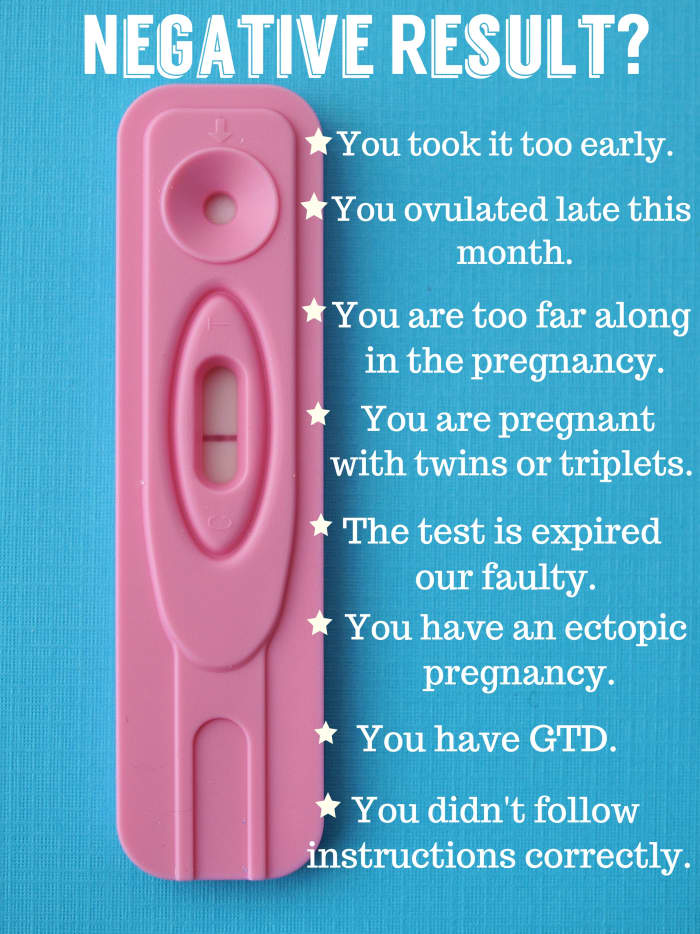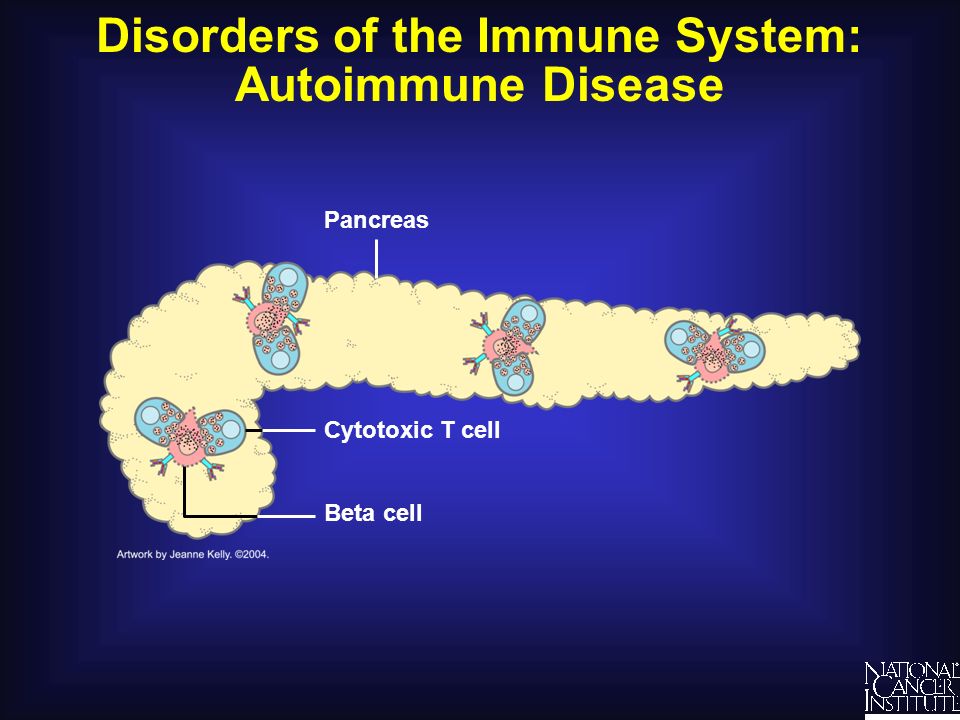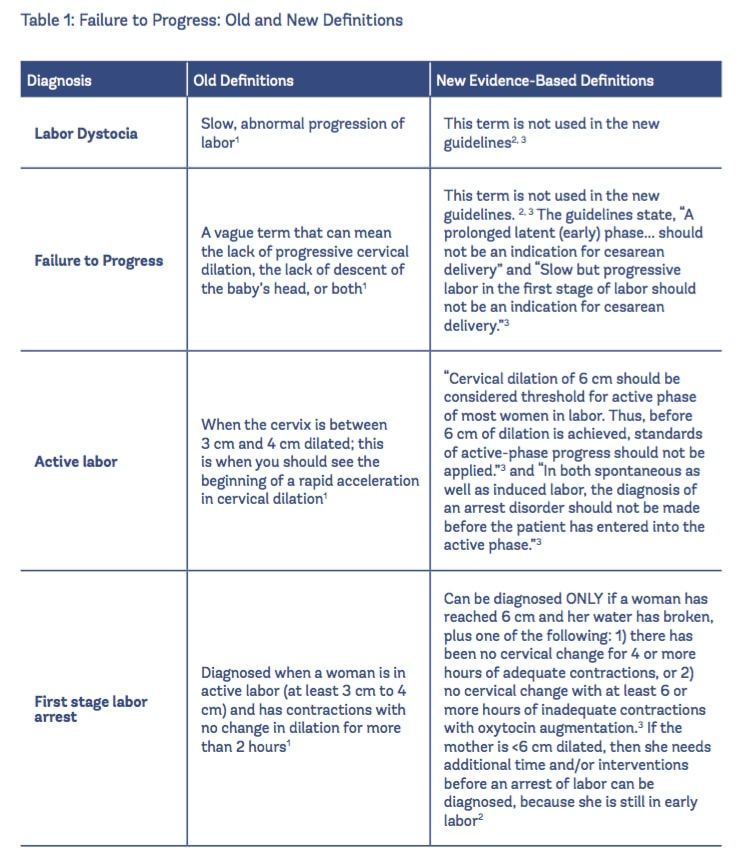Positive pregnancy test but no symptoms
Positive Pregnancy Test but No Symptoms? Here’s 7 Reasons Why
Baby Basics, Baby's Nursery, Babymoon, Childproofing, Conceiving, Family Involvement, Getting Pregnant, Healthy Pregnancy, Healthy Weight, Home Birth, Hormones, Labor, Labor Contractions, Medicationsbaby basics, conceiving, Getting Pregnant, pregnancy, pregnancy blogs, Pregnancy Brain, Pregnancy Meditation, Pregnancy Safety, Relaxation, Safety Tips, Stages of Pregnancy, Women's HealthMithu Kuna
Share with:
After the excitement of a positive pregnancy test has subsided, you feel a little worried. Why don’t you feel any different?
You don’t feel any morning sickness and you haven’t turned into the stereotypical ravenous pregnant lady yet. Are you even expecting? Anxieties about you and your baby’s health swirl in your mind: Maybe the test was false or maybe you lost the fetus.
Luckily, a lack of pregnancy symptoms doesn’t necessarily mean anything is wrong.
In this post, we’re listing 7 reasons why you may not feel any pregnancy signs.
Pregnancy SymptomsEvery pregnancy is different, so every woman will experience a different set of symptoms. Some women will only experience one or two, while others may have to deal with a whole list. Some signs will only be present for the first or last trimester. Others may subside and flare up throughout the 9 months. Even if you’ve been pregnant before, you could show different signs the second or third time around.
During early pregnancy, the symptoms can be similar to those you get around menstruation. These include:
- Implantation bleeding
- Sore or swollen breasts
- Fatigue
- Mood swings
- Back pain
- Headaches
- Dizziness
Since these symptoms can be confused, some women don’t know they’re pregnant until a few weeks later when the signs are more apparent. Symptoms of pregnancy later on include:
Symptoms of pregnancy later on include:
- Constipation
- Insomnia
- Fatigue
- Leg cramps
- Leg and feet swelling
- Dizziness
- Heartburn
- Vaginal discharge
- Backaches
- Braxton-Hicks contractions
- Morning sickness
Although having these symptoms can mean you’re pregnant, the only way to know for sure is to take a pregnancy test.
Positive Pregnancy Test but No Symptoms. Why?If you’ve taken a pregnancy test and it’s positive, you’re probably expecting some physical changes. When those symptoms don’t happen, it can be worrisome. You may wonder if you’re still pregnant or if something happened. If you’ve checked with your doctor and everything is okay, there’s a few reasons you could be symptomless.
#1 You Haven’t Recognized the Early Signs
One possibility is that you actually have experienced early pregnancy symptoms, but you had mistaken them for menstrual symptoms. For example, you may experience spotting or cramping about 6 to 12 days after the egg is fertilized. This is called implantation bleeding. Although it’s not the same flow as a regular period, you may have assumed you were just having an off month.
For example, you may experience spotting or cramping about 6 to 12 days after the egg is fertilized. This is called implantation bleeding. Although it’s not the same flow as a regular period, you may have assumed you were just having an off month.
#2 It’s Too Early
All women are different when it comes to experiencing pregnancy symptoms. Some women don’t feel anything different until the second half of their first trimester or even later. If this is the case, you get to enjoy an extra few weeks of being problem-free.
If you’ve just conceived and are hoping for pregnancy signs, you’ll probably need to wait a little longer. If the fertilized embryo isn’t implanted yet, you won’t experience any symptoms. This happens 6 to 12 days after ovulation. After this time, you should take a pregnancy test to check.
#3 You Don’t Get Symptoms
Most women will experience some pregnancy symptoms but not everyone. Some lucky moms report having no signs—other than a growing belly—for their entire 9 months. Although it can cause anxiety, try to be thankful for having an easy pregnancy. You should still mention the absence of signs to your doctor and attend regular check-ups to make sure your baby is healthy.
Although it can cause anxiety, try to be thankful for having an easy pregnancy. You should still mention the absence of signs to your doctor and attend regular check-ups to make sure your baby is healthy.
#4 You’re Attributing Symptoms to Something Else
Another possibility is that you are experiencing pregnancy signs, but you’re thinking they’re caused by something else. For example, you may be feeling more tired than usual, leading to more naps or earlier bedtimes. Instead of seeing this as pregnancy fatigue, you may have assumed it’s just because you’ve had a really long work week and you’ve been running around more than usual. Mood swings could be blamed on family conflict or routine stress rather than your bun in the oven. If you’re experiencing any changes, ask yourself if they could be caused by pregnancy instead.
#5 You’re Expecting More Dramatic Symptoms
Movies often depict women violently throwing up as soon as they become pregnant. Luckily, this isn’t always the case. While some women experience visible changes, such as morning sickness and swelling, others only have subtle changes. These may include:
Luckily, this isn’t always the case. While some women experience visible changes, such as morning sickness and swelling, others only have subtle changes. These may include:
- Minor appetite changes
- Fatigue
- Mood changes
- Aches
Some women may experience these signs on a more extreme level. However, you may not even notice your stomach rumbling more frequently or your energy depleting easier.
#6 You Have Polycystic Ovary Syndrome (PCOS)
PCOS is a hormonal disorder characterized by prolonged periods, infrequent periods or elevated male hormone levels. This causes ovarian cysts. Many women with PCOS don’t release eggs regularly, making it difficult to become pregnant.
When a woman with PCOS does successfully conceive, she may only experience subtle symptoms and sometimes none at all. It’s possible to have PCOS and not know it. Up to 50% of women never get diagnosed. Signs of the disorder include:
- Irregular periods
- Trouble getting pregnant or having a miscarriage
- Cysts on ovaries
- Pelvic pain
- Excessive hair growth or acne (caused by high male hormone levels)
- Weight gain
- Skin tags on the neck or armpits
- Dark and thick skin patch on breasts, thighs or neck
If you suspect you have PCOS, you should tell your doctor.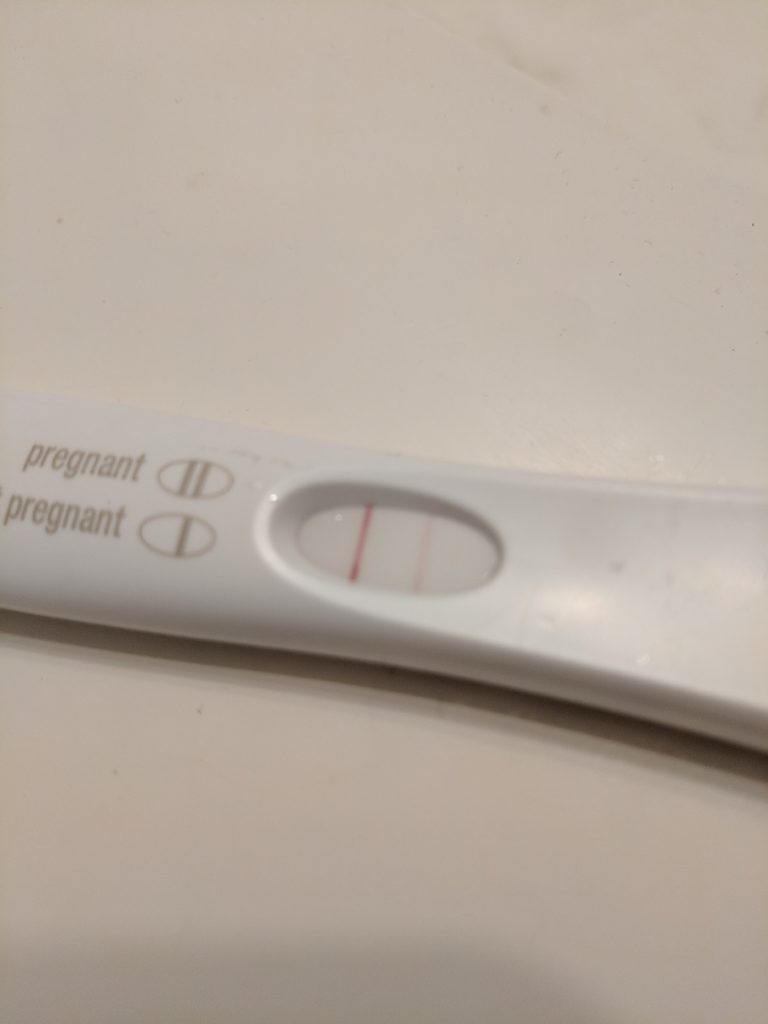 Although there’s no cure, they can diagnose the issue, help you treat its symptoms and monitor your pregnancy more closely.
Although there’s no cure, they can diagnose the issue, help you treat its symptoms and monitor your pregnancy more closely.
#7 False Pregnancy Tests
If you haven’t had your pregnancy confirmed by a doctor yet, you may be wondering if your at-home test is actually accurate. Home tests work by detecting human chorionic gonadotropin (hCG), a hormone present in early pregnancy. For this reason, most sticks are very accurate. In fact, positive results are more likely to be accurate than negative results. However, that doesn’t mean getting a false positive is impossible. Inaccurate home tests could be the result of:
- Chemical pregnancy— When the fertilized egg can’t implant or grow (this can happen for multiple reasons, such as scar tissue, fibroids or low hormone levels).
- Miscarriage— When a miscarriage occurs, hCG levels will slowly decline. Since the hormone can still be present weeks later, it’s possible to still get a positive result after a miscarriage.
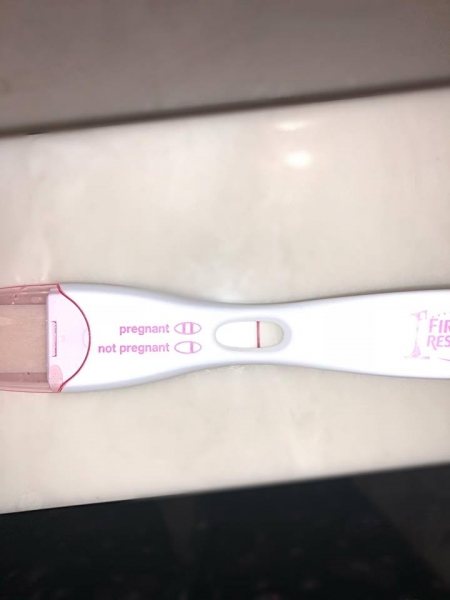
- Ectopic pregnancy— When a fertilized egg implants outside of the uterus. Ectopic pregnancies are not viable but will still produce hCG.
- Medication— Fertility medications, some anti-anxiety and some anticonvulsants may also cause a false positive if you take the test too soon after conception.
- Using it wrong— If you haven’t followed the directions for your home test or are using an expired test, it’s possible to get a false result. Read the directions and follow them exactly as written. Doing the test first thing in the morning when your urine is undiluted may lead to the most accurate result. Waiting 10 minutes to view the result may also improve accuracy. Although you may be excited, you should avoid taking the test too early. Waiting one week after your missed period is a good idea.
If you’ve had a positive at-home pregnancy test, you should see your doctor. They will do additional tests to confirm you’re pregnant. For example, blood tests can detect hCG earlier in pregnancy compared to home tests. He or she may also test your urine and do an internal exam.
They will do additional tests to confirm you’re pregnant. For example, blood tests can detect hCG earlier in pregnancy compared to home tests. He or she may also test your urine and do an internal exam.
If you’re not experiencing any symptoms and you’re in the second half of your first trimester, you should tell your doctor about your concerns. During your routine check-ups, you should also inform him or her of any changes. If you were experiencing symptoms but they came to a sudden halt, that could be a cause for concern.
If you have signs of a miscarriage, you should contact your doctor immediately. This includes:
- Bleeding
- Fever
- Weakness
- Severe cramps
- Abdominal pain
If you get a positive pregnancy test and your doctor has confirmed the result, it’s still possible to have no symptoms. Although it can be worrisome, there may be no cause for concern. Every woman’s pregnancy is different. Some will experience a tough 9 months and struggle through just about every possible symptom. Other women will carry a healthy baby yet show no signs of it. Symptoms may also pop up later on in your journey instead. If your doctor says everything is okay despite a lack of symptoms, consider yourself lucky to have a problem-free pregnancy.
Some will experience a tough 9 months and struggle through just about every possible symptom. Other women will carry a healthy baby yet show no signs of it. Symptoms may also pop up later on in your journey instead. If your doctor says everything is okay despite a lack of symptoms, consider yourself lucky to have a problem-free pregnancy.
Do you have a lack of symptoms during your pregnancy? If so, comment below about your experience. If you have any pregnant friends, be sure to share this post with them, too!
P.S. Some women are able to detect pregnancy problems after noticing their symptoms suddenly stopped. If you haven’t experienced any symptoms, you may be worried you miscarried without noticing. Starting at the 12th week, you can use an at-home fetal doppler to hear your baby’s heartbeat and ease anxiety. Simply glide the probe over your lower belly and share the sound of life with all of your family. Get your fetal heartbeat monitor for as low as $39.95 today!
Get your fetal heartbeat monitor for as low as $39.95 today!
Share with:
What Could Be Wrong? – Neeva Baby
If you took an early pregnancy test and the result was positive, but you are not experiencing any typical pregnancy symptoms, don't panic just yet. There are several reasons why this could happen.
Don't worry; if you're experiencing a no-symptoms pregnancy, it doesn't mean that something is wrong. But is it possible to be pregnant with no symptoms???
Most pregnancies that result in a lack of symptoms are perfectly healthy. However, it's essential to be aware of the possible causes of a with no signs so that you can be sure that everything is okay.
Here is your ultimate guide that will discuss some of the most common causes of a positive test with no pregnancy symptoms.
Could I be Pregnant With No Symptoms?
For many women, the early weeks of pregnancy are accompanied by a variety of symptoms, from fatigue and morning sickness to food cravings and mood swings.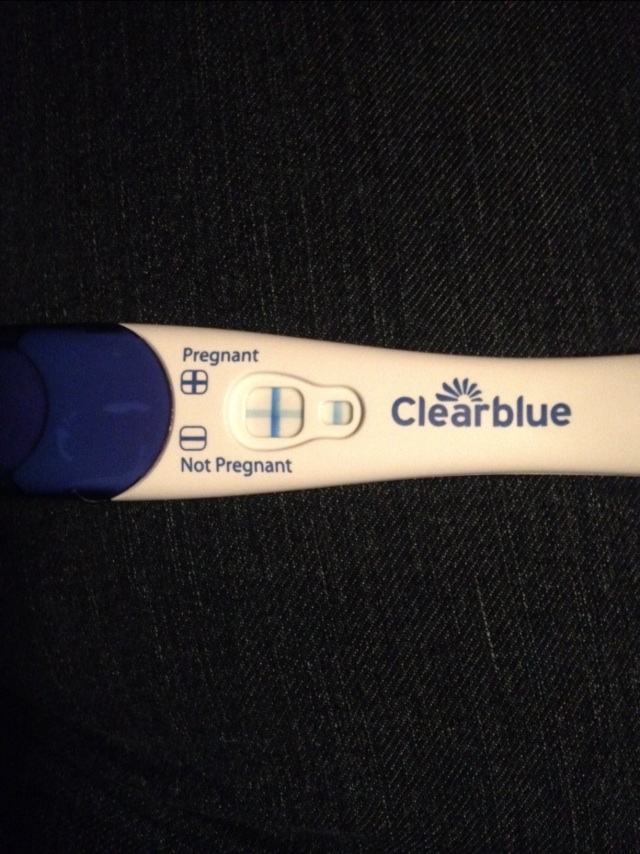
However, it is also possible to be pregnant for 5 to 7 weeks with no symptoms.
This is known as a “silent” or “ symptomless” pregnancy, and it is more common than you might think. There are a number of reasons why you might experience a silent pregnancy, including if you have a low level of the hormone HCG or if you are carrying a small amount of amniotic fluid.
Even if you may feel like you aren't going through any symptoms, it's actually possible for your symptoms to be subtle enough that you don't notice them.
If you did take a pregnancy test that came out positive, chances are that you're pregnant, even if you don't feel pregnant. Additionally, if you have an early ultrasound that detects a fetal heartbeat, there's no doubt that you're having a baby!
What are Some Possible Causes of a Positive Pregnancy Test With no Symptoms?
Here are a few of the most common causes:
- Hormonal imbalance: This is one of the most common reasons for a positive test result with no symptoms.
 A hormonal imbalance can be caused by many things, such as stress, illness, or changes in your diet or exercise routine.
A hormonal imbalance can be caused by many things, such as stress, illness, or changes in your diet or exercise routine. - Miscarriage: A miscarriage is a common cause of a positive pregnancy test with no symptoms. Up to 25% of pregnancies end in miscarriage, so don't worry if you think this might cause you.
- Ectopic pregnancy: An ectopic pregnancy is another common cause of a positive pregnancy test with no symptoms. An ectopic pregnancy occurs when the fertilized egg implants itself outside the uterus. While this is a severe condition, it is also relatively rare, occurring in only about two percent of pregnancies.
- Molar pregnancy: A molar pregnancy is a rarer cause of a positive pregnancy test with no symptoms. A molar pregnancy is a non-viable pregnancy in which the placenta develops abnormally. This can cause symptoms such as severe nausea and vomiting.
- Gestational trophoblastic disease (GTD): GTD, known as gestational trophoblastic disease (GTD), is an uncommon yet deadly illness that can manifest itself without warning.
GTD is a group of conditions that involve the abnormal growth of cells in the uterus. This can cause bleeding and other symptoms.
- Chromosomal abnormalities: Chromosomal abnormalities are another severe but rare cause of a positive pregnancy test with no symptoms. These abnormalities can occur when the egg or sperm is abnormal. This can cause the embryo to develop abnormally.
- Infection or sepsis: Infection or sepsis is a severe but rare cause of a positive test with no pregnancy symptoms. Sepsis is a potentially life-threatening condition when an infection spreads throughout the body. This can cause several symptoms, including fever, chills, and rapid breathing.
These are the most common causes that you can become pregnant with no symptoms. If you are concerned that you might be pregnant but are not experiencing any symptoms, the best thing to do is make an appointment with your doctor or midwife.
How can you tell if you're pregnant or if there's another explanation for your positive test result?
There are a few ways to tell if you're pregnant or if there's another explanation for your positive test result. The most common way to tell is by taking a second pregnancy test. If the second test is also positive, then it's likely that you are already a couple of weeks pregnant. Another way to tell is by checking for other symptoms of pregnancy. These can include nausea, fatigue, breast tenderness, and frequent urination. If you are experiencing any of these symptoms, then it's likely that you are pregnant. If you are not experiencing these symptoms, there might be another explanation for your positive test result.
When should you see a doctor if you have a positive pregnancy test but no symptoms?
If you have a positive pregnancy test but no other symptoms, you should visit your doctor immediately. There are several possible causes for this, and some of them can be serious. Your doctor will give you more information and determine whether or not you need further testing.
What kind of tests might the doctor order to determine the cause of your symptoms?
The doctor might order a blood test to check for pregnancy hormones. The doctor might also order an ultrasound to check for a gestational sac. In some cases, the doctor might also recommend a laparoscopy. This is an outpatient surgical procedure in which a small incision is made in the abdomen to inspect the uterus and ovaries. For other cases, the doctor might recommend a biopsy. This is a procedure in which a small tissue sample is removed from the uterus for examination.
Are there any treatments available for women with positive pregnancy tests with no symptoms?
Of course, when your doctor has determined the cause of your no-symptoms pregnancy, they will discuss treatment options with you. If you have an ectopic pregnancy, you will likely require surgery. If you have a molar pregnancy, you will probably need to terminate the pregnancy. In some cases, GTD can be treated with chemotherapy. If you have an infection, you will likely need to be treated with antibiotics.
No matter the cause of your pregnancy without symptoms, it's essential to see your doctor so that they can properly diagnose and treat you. Just keep yourself calm and take everything one step at a time!
Related Posts
How much does IVF cost?
Thinking about IVF? Well, before any kind of fertility treatment, one of the first things you need to consider is the...
Read More
What is Baby Crowning & How to Prepare for It?
What is crowning in birth? How does a pregnant woman's ring of fire feel? During the weeks leading up to childbirth...
Read More
Hook Effect: A False Negative Pregnancy Test
Even before you get pregnant, you have probably heard about pregnancy symptoms. You know that symptoms such as morn...
Read More
5 Causes of a False Positive Pregnancy Test
If a woman is trying to conceive or suspects pregnancy, a pregnancy test, available from pharmacies or personal care stores, can help confirm these suspicions.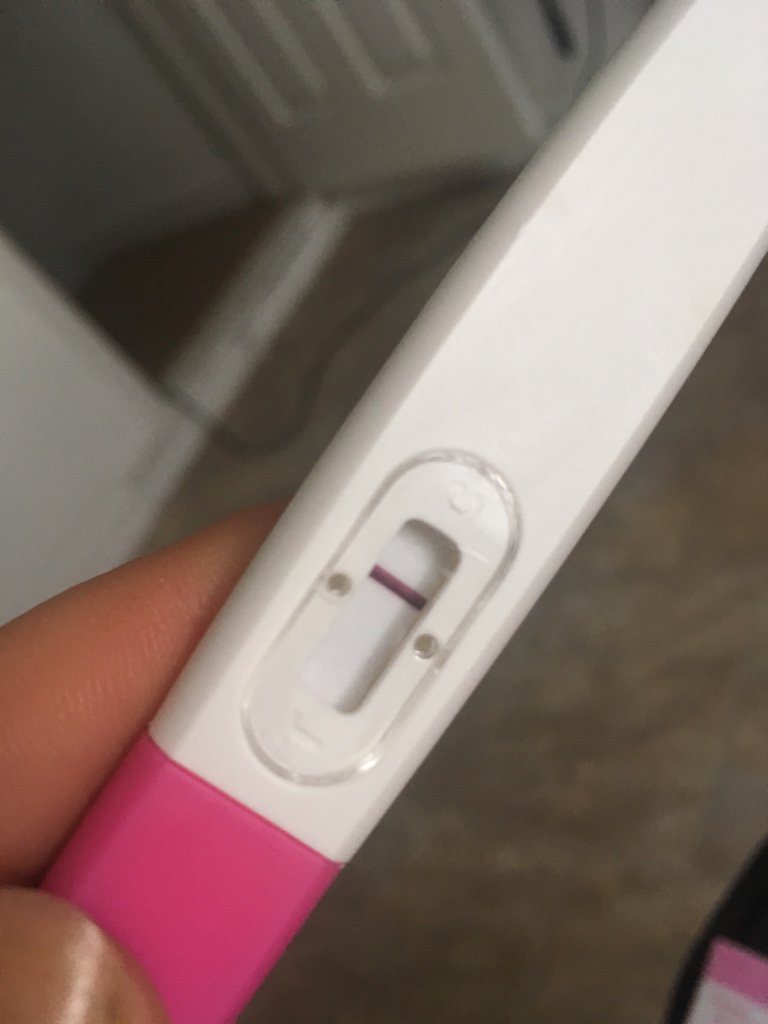 Although many home pregnancy tests are 99% accurate, they are not perfect. A false positive result of a pregnancy test is one that indicates the presence of pregnancy in its absence.
Although many home pregnancy tests are 99% accurate, they are not perfect. A false positive result of a pregnancy test is one that indicates the presence of pregnancy in its absence.
Pregnancy tests detect the presence of human chorionic gonadotropin (hCG) in the urine, a pregnancy hormone that is excreted in the urine and in the blood during pregnancy. It is important to note that when taking a pregnancy test, a woman should know that even a weak plus sign or a second line indicates a positive result.
However, not all positive pregnancy tests mean that a woman is pregnant. There are some cases where a pregnancy test can give a false positive result:
Incorrect use of the test. When performing a home pregnancy test, it is important to follow the instructions carefully. Each brand has specific instructions, so it's important to read them carefully. For most tests, the result should be evaluated within 4-5 minutes after the test and no more than 10-30 minutes after that.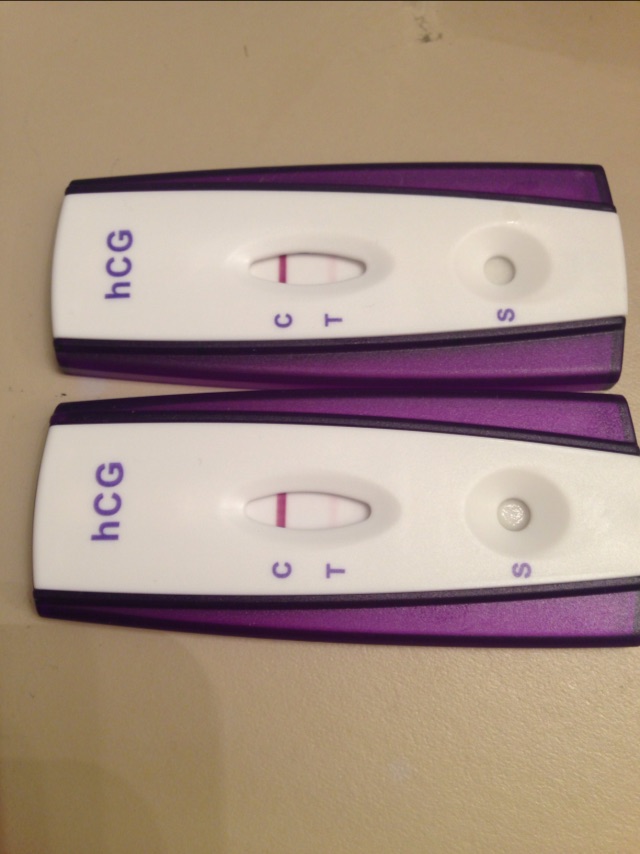 If the pregnancy test is read after the recommended time, this may cause a weak second line to appear on the test - as a rule, this line appears after the urine has evaporated.
If the pregnancy test is read after the recommended time, this may cause a weak second line to appear on the test - as a rule, this line appears after the urine has evaporated.
Previous miscarriage or abortion. After an abortion or miscarriage, a home pregnancy test may result in a false positive because the hCG levels in the woman's body may still be relatively high. As soon as a fertilized egg implants in the uterine wall, the body begins to secrete the hCG hormone. After a miscarriage or abortion, hCG levels begin to drop, but this happens slowly. As a rule, hCG decreases over a period of 9 to 35 days. The average time interval is about 19days. Taking a pregnancy test during this period may result in a false positive result.
In some cases, a miscarriage may not occur completely, as a result, tissue remains in the uterus that provokes the release of hCG. In this situation, surgery may be required to remove any retained products of conception.
Molar pregnancy.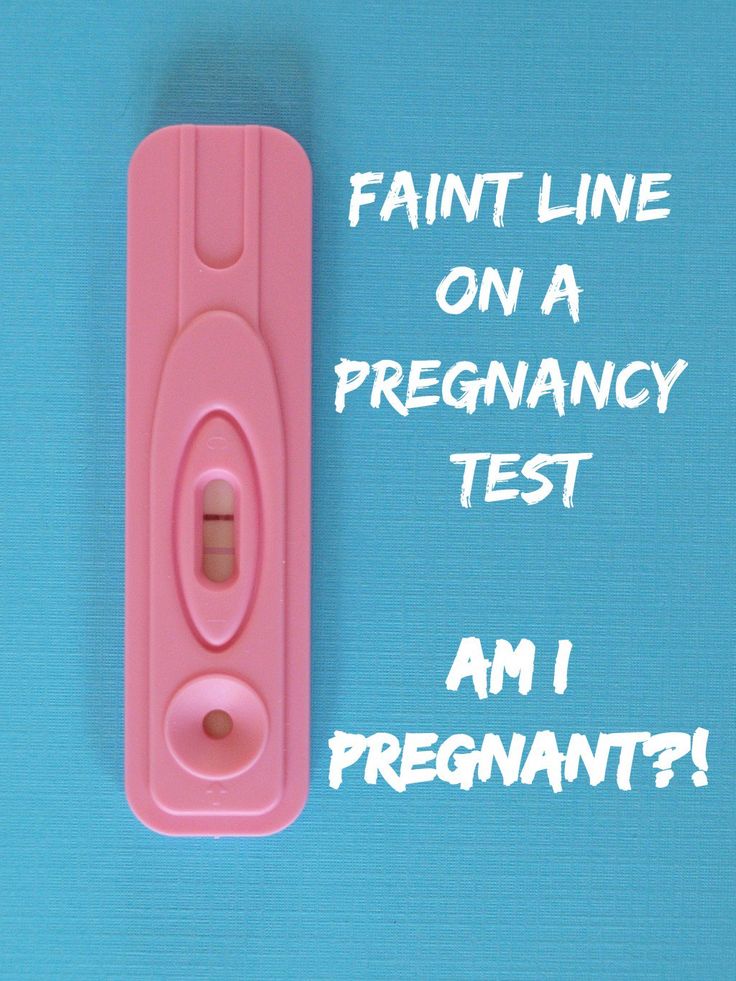 It is caused by genetic abnormalities at conception and leads to abnormal pregnancy. In a complete molar pregnancy, the embryo does not develop, but the placental tissue grows rapidly. Typically, this happens because the woman's eggs lack the maternal chromosome, and the egg is fertilized by one or two sperm. In a partial molar pregnancy, the egg is fertilized by 2 spermatozoa. This results in an embryo containing 1 set of chromosomes from the mother and 2 sets of chromosomes from the father - 69chromosomes instead of the normal set of 46 chromosomes.
It is caused by genetic abnormalities at conception and leads to abnormal pregnancy. In a complete molar pregnancy, the embryo does not develop, but the placental tissue grows rapidly. Typically, this happens because the woman's eggs lack the maternal chromosome, and the egg is fertilized by one or two sperm. In a partial molar pregnancy, the egg is fertilized by 2 spermatozoa. This results in an embryo containing 1 set of chromosomes from the mother and 2 sets of chromosomes from the father - 69chromosomes instead of the normal set of 46 chromosomes.
Instead of a normal placenta and embryo, placental tissue in molar pregnancy develops in a way that resembles a bunch of grapes. To eliminate such a pregnancy, an operation is required with careful monitoring of the level of hCG in a woman after the intervention. Sometimes a condition called persistent gestational trophoblastic disease can occur, which is associated with the continued growth of molar pregnancy products in the uterus. In this situation, surgery is required to remove the uterus or chemotherapy.
In this situation, surgery is required to remove the uterus or chemotherapy.
Medicines. Certain medications may cause a false positive pregnancy test result. These medicines include preparations with hCG as the active ingredient, which are often used to treat infertility. Yet most medications do not affect the results of home pregnancy tests.
Pathologies. Certain diseases and conditions can cause a woman's hCG levels to rise even if she is not pregnant. They include:
- disorders affecting pituitary hormone levels, especially in perimenopausal or menopausal women;
- gestational trophoblastic disease;
- cancer of the ovary, bladder, kidney, liver, lung, colon, breast and stomach;
- phantom hCG, when certain body proteins bind to molecules in a pregnancy test kit, resulting in a false positive result;
- ovarian cysts;
- kidney disease or urinary tract infection.
If a pregnancy test indicates a positive result, it is important to notify your physician as further evaluation and testing will be required to confirm and monitor pregnancy.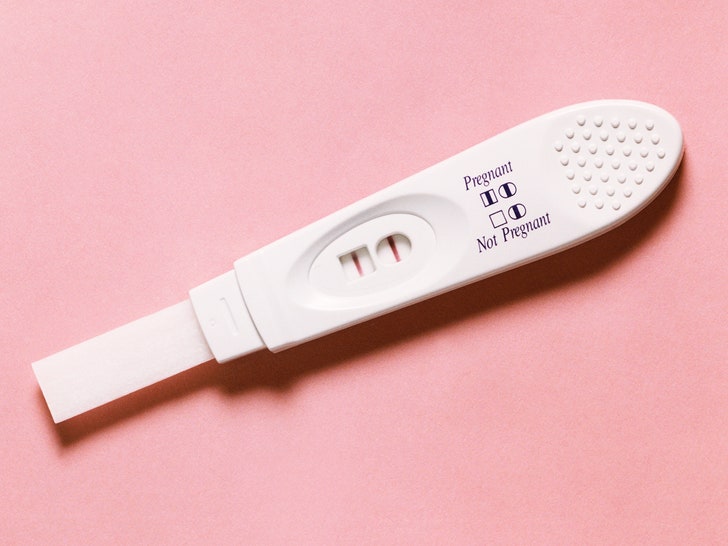
Based on www.medicalnewstoday.com
About the pregnancy test
December 24, 2017
There are two lines on the test, but there is no pregnancy: does it happen?
Pregnancy can be both a long-awaited and a very unexpected event in the life of a woman or family. At that moment, when a woman begins to suspect about her “interesting position” or cannot connect the appearance of new characteristic symptoms with anything else, a pregnancy test comes to the rescue. This simple, but at the same time very convenient invention "works" quite accurately. The probability of an erroneous result with a timely test does not exceed 1%. Moreover, the test can be both false negative and false positive. Today we will talk about those situations when the test shows a positive answer, although the woman is not pregnant. Why does this sometimes happen?
How does a pregnancy test work?
To understand why a pregnancy test can give a false result, it is important to understand how it works.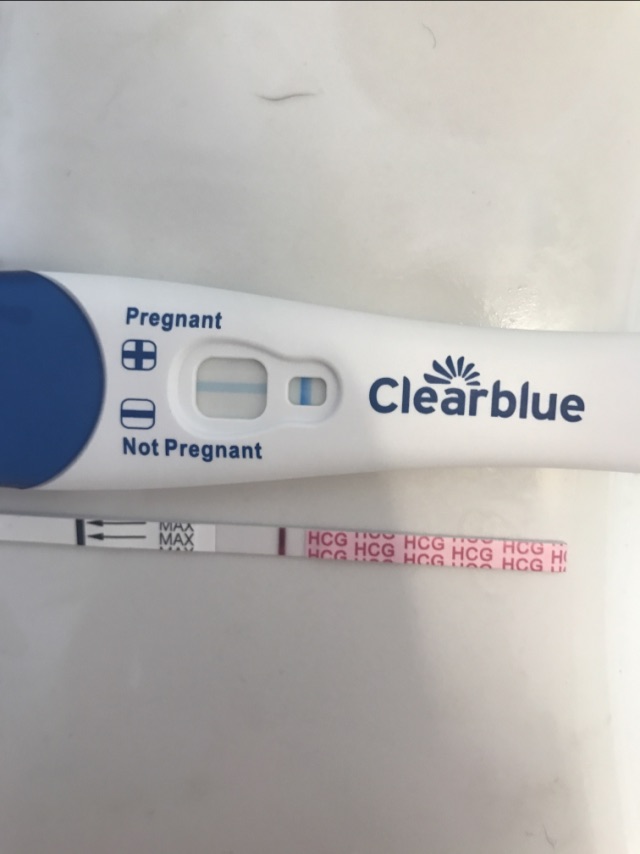 Before performing the test, read the instructions for use. The procedure is very simple: dip the test strip with a certain end into a container with urine or substitute it under a stream of urine, then evaluate the test after a specified time.
Before performing the test, read the instructions for use. The procedure is very simple: dip the test strip with a certain end into a container with urine or substitute it under a stream of urine, then evaluate the test after a specified time.
The appearance of two strips on the test will indicate a positive result, that is, an existing pregnancy. This is magic? Or how to explain such an amazing phenomenon that a narrow test strip can notify a future mother about an upcoming addition to the family earlier than a doctor?
What is hCG?
No, there is no magic in a pregnancy test. Simple chemistry. The test strip contains a chemical indicator that reacts with human chorionic gonadotropin (hCG). This is one of the earliest pregnancy hormones, which is secreted by the chorionic villi (future placenta). Its release begins from the moment the fetal egg attaches to the uterine wall, and continues throughout the pregnancy. It can be determined in the blood or urine of the expectant mother. The pregnancy test is based on the detection of hCG in the urine of the mother.
The pregnancy test is based on the detection of hCG in the urine of the mother.
It is recommended that the test be performed no earlier than the first day of a missed period or approximately two weeks after the expected day of conception if the woman's cycle is irregular.
Why is a pregnancy test false positive?
Women react differently to the appearance of two strips on the test, because for someone pregnancy is a cherished dream, for someone it is an unpleasant surprise. In any case, a positive test result is only the first step in diagnosing pregnancy.
By the way, the test result is not always expressed as the number of strips. Sometimes the signs "+" or "─" appear, sometimes the words "pregnant" or "not pregnant", "Yes" or "No". This does not change the essence of the matter, because any pregnancy test only reflects the amount of hCG in the urine of the test.
However, it may happen that the test strip shows a positive result in the absence of pregnancy. Why? Let's take a look at the most common causes of a false positive pregnancy test.
Why? Let's take a look at the most common causes of a false positive pregnancy test.
Postpartum period
The level of hCG increases in the bloodstream and in the urine of the expectant mother from the first days of pregnancy, reaching its maximum in the third month of gestation (7-11 weeks). After reaching this period, the level of the hormone gradually decreases. However, the test remains positive throughout the pregnancy and even for some time after it ends (on average 3 weeks).
That is, there is no need to panic if the test shows two stripes after a recent birth. This does not mean that a woman will soon become a mother again. It just takes time for the hCG levels to drop. However, we must not forget about reliable contraception even in the first months after childbirth, if the family does not plan children of the same age.
Recent miscarriage or abortion
After a miscarriage (miscarriage, miscarriage) or abortion, the level of hCG also does not decrease immediately.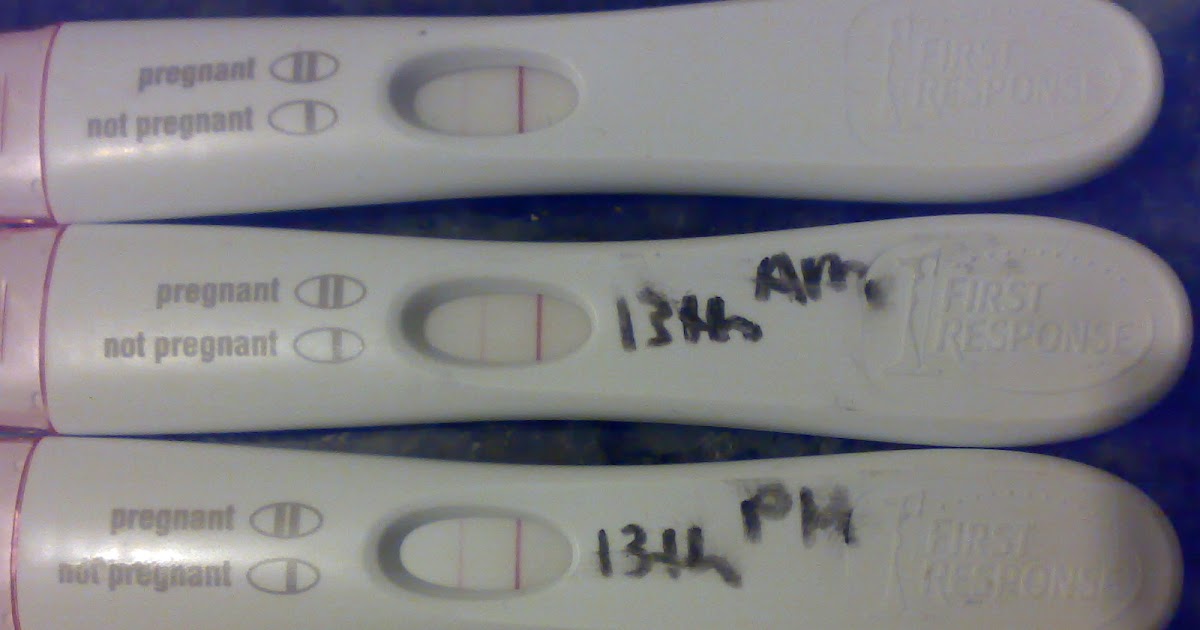 This period can last from 9 to 35 days (about 3 weeks on average). Accordingly, a pregnancy test done in this time period may be positive if there is no embryo in the uterus at the time of the test. A positive test will be especially long if there are remnants of placental tissues in the uterine cavity.
This period can last from 9 to 35 days (about 3 weeks on average). Accordingly, a pregnancy test done in this time period may be positive if there is no embryo in the uterus at the time of the test. A positive test will be especially long if there are remnants of placental tissues in the uterine cavity.
If in doubt about the presence of pregnancy, a woman should donate blood for the level of hCG (this is not only a qualitative, but also a quantitative analysis) and / or do an ultrasound of the pelvic organs. This will make it possible to understand whether there is a pregnancy, or whether the test still reflects the presence of hCG from a pregnancy that was very recent.
Vesical mole
Women know very little or have never even heard of this disease, but obstetrician-gynecologists are very afraid of it. What is a blister? This is one of the most serious pathologies of pregnancy, in which the villi of the chorion (placenta) pathologically change.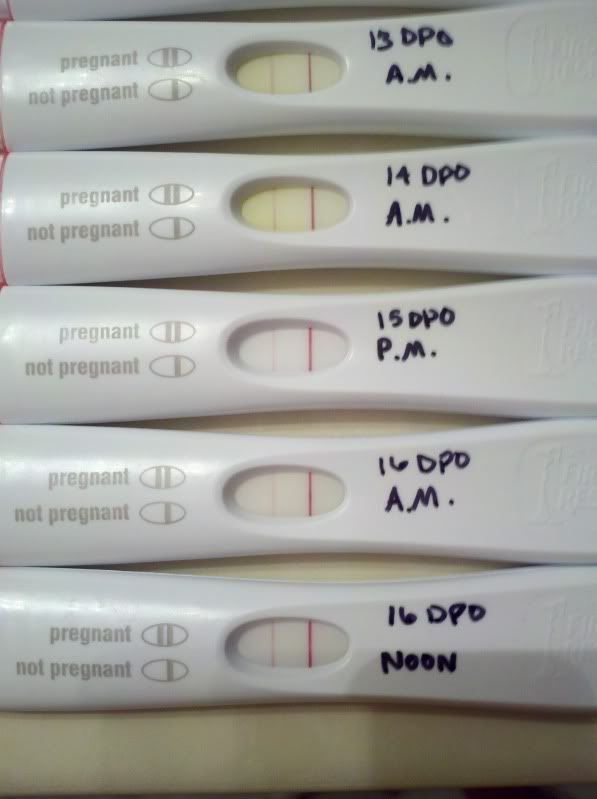 More often young women get sick. The reasons for this condition have not yet been fully established.
More often young women get sick. The reasons for this condition have not yet been fully established.
In the case of hydatidiform mole, bubble-like extensions form along the course of the chorionic villi. There are different forms of cystic drift. The normal development of the fetus with such a development of events in most cases is impossible, it dies. The disease itself is very serious, it can even threaten the life of the patient. Removing the mole is the only way to treat a woman.
Pregnancy test is always positive when a mole develops. Even the uterus grows in size because the chorionic villi grow like grapes. Of decisive importance in the diagnosis of hydatidiform mole is ultrasound examination of the uterus.
Chorionepithelioma (chorioncarcinoma)
This is a malignant tumor of the trophoblast (ie chorionic villus or placenta). Chorionepithelioma can be a consequence of cystic drift, as well as an independent disease. It happens both in pregnant women and in women in the postpartum period.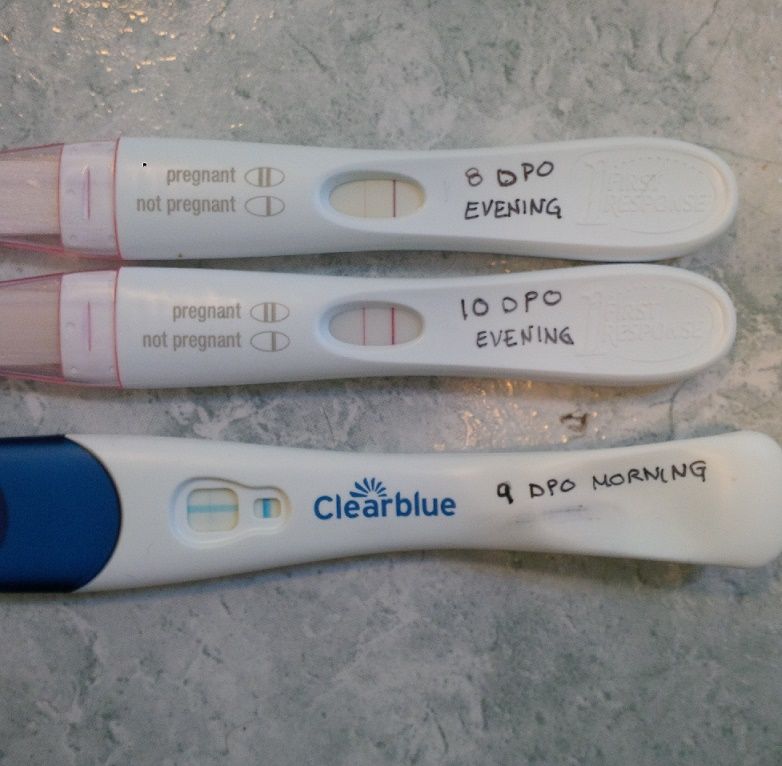
The tumor quickly metastasizes, forming foci in various internal organs. Since the tumor is based on trophoblast tissue, a large amount of hCG is produced, as a result of which the pregnancy test will be positive. The disease is very severe, the prognosis is serious.
Superovulation in preparation for IVF
Some women dream of having a baby so much that they take pregnancy tests even when it is not necessary, for example, in preparation for in vitro fertilization (IVF). During the period of taking drugs for superovulation, a large amount of hCG is produced in the ovaries, which will necessarily manifest itself as a positive test result, although pregnancy is still far away. Doctors should inform the patient in advance about this so that she does not make hasty conclusions that she was able to get pregnant on her own.
Tumors of the internal organs
All of the above reasons for a false positive pregnancy test are still related to pregnancy, even if it has recently ended or has not yet occurred.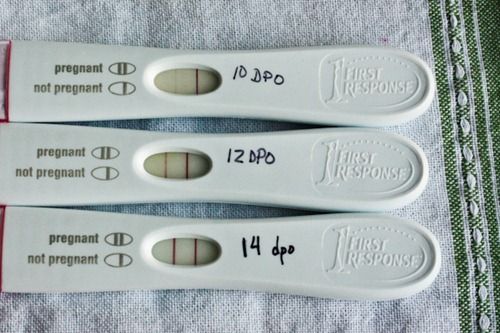 But it also happens that a positive test has nothing to do with pregnancy. We are talking about tumor processes in the internal organs, in which the tumor produces hCG. This happens with tumors of the ovaries, brain, cancer of the lungs, stomach, breast, etc.
But it also happens that a positive test has nothing to do with pregnancy. We are talking about tumor processes in the internal organs, in which the tumor produces hCG. This happens with tumors of the ovaries, brain, cancer of the lungs, stomach, breast, etc.
As a rule, a woman learns about the presence of malignant tumors in other ways, and not through a positive pregnancy test. Still, a pregnancy test is usually done with a delay in menstruation, while a cycle failure in the presence of tumors is not at all necessary.
Technical violations during the test
It is very rare that a woman has a low-quality test in her hands that gave a false positive result. However, knowing that this happens, many women deliberately do several pregnancy tests from different companies. Repeated test failure is unlikely. In addition, when conducting a test, it is necessary to strictly record the time allotted for interpreting the result. Usually it is 3-5 minutes.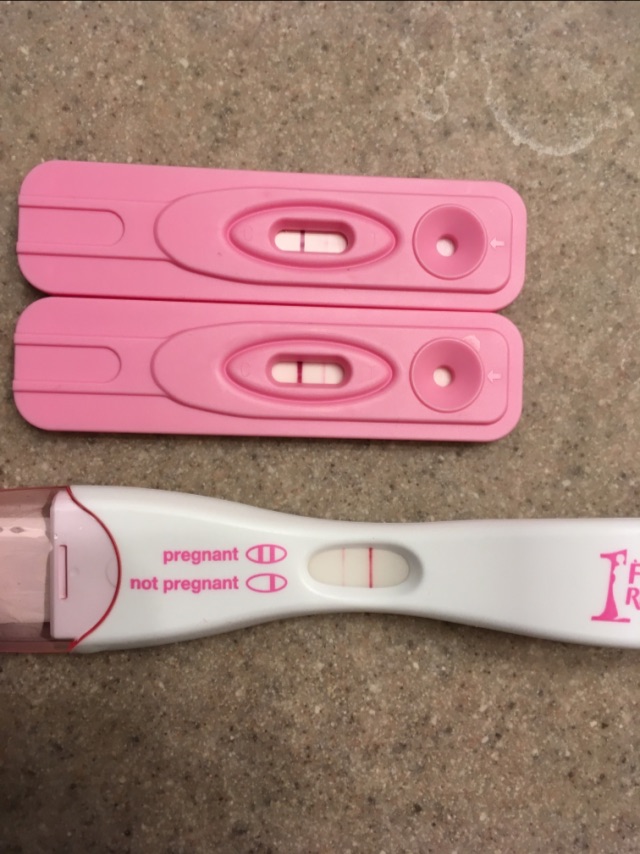
By the way, it's not bad if another person (girlfriend, spouse) also evaluates the test. It happens that a woman simply imagines the desired stripe, while in fact it is not there.
What if I have doubts about a pregnancy test?
It happens that a woman doubts the correctness of the test. For example, the test shows a positive response, although there are no other signs of pregnancy. Or there are menstrual-like discharge, although the test speaks in favor of pregnancy. Or in a situation where two tests showed different results? What to do?
- First, don't try to find the truth yourself. The most correct thing is to consult an obstetrician-gynecologist. It is he who will decide what needs to be done in the first place: donate blood from a vein for hCG, do an ultrasound of the uterus and ovaries, or simply examine the patient on the chair.
- Second: don't try to get rid of a pregnancy (which hasn't even been confirmed yet) out of the hospital.
